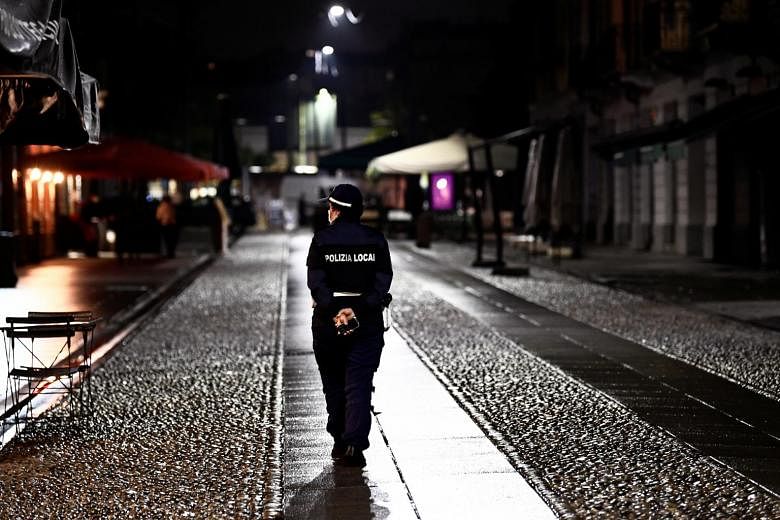LONDON - European governments are stepping up restrictive measures to contain the coronavirus pandemic, from reimposing shutdowns, setting curfews to closing bars and restaurants.
Ireland has become the first European country to return to a nationwide shutdown as Covid-19 cases rise, and the Czech Republic is following in its footsteps.
France has introduced a general curfew. And Britain has tightened restrictions by closing pubs and restaurants, with even more draconian measures applied in different parts of the country.
However, Europe now generates almost half of the newly registered coronavirus infections, according to statistics compiled by the World Health Organisation.
And there is no agreement on what should be done. The only consensus to have emerged in Europe is that whatever trajectory the pandemic takes, the economic costs of reimposing total shutdowns are increasingly becoming unaffordable.
Ireland, which has experienced a 75 per cent rise in infections over the past month and has already recorded almost 2,000 deaths in a population of around five million, enforced its highest level of restrictions from Thursday (Oct 22).
For the next six weeks, its people are told to stay at home and can only go out briefly within a 5km radius.
"We're making a pre-emptive strike against the virus, acting before it's too late", Ireland's Deputy Prime Minister, Mr Leo Varadkar, said.
But he also admitted that the country expects 150,000 people to lose their jobs over the next "couple of days". He estimated that the shutdown would inflict a loss of around €1.5 billion (S$2.4 billion) on Ireland in extra spending on unemployment benefits and grants, and this is before one takes into account the potential drop in tax revenue.
"Lockdowns save lives, but they also come with huge costs", Mr Varadkar explained.
It is noticeable that although the Czech Republic - which now suffers Europe's highest infection rate at almost 900 per 100,000 residents - followed Ireland into a total lockdown, its measure is only intended to last until Nov 3, largely in order to contain the financial impact.
Elsewhere in Europe, public authorities insist that they do not envisage a complete shutdown like the one in February and March, when the pandemic first struck the continent. Instead, they are focusing on banning social activities.
In Belgium, which at over 800 cases per 100,000 inhabitants is only second to the Czech Republic in the infection stakes, cafes and restaurants are closed for four weeks and a curfew from midnight to 5am came into force on Monday.
Belgium, which invented the concept of "social bubble" this summer by limiting the number of people with whom one can have contact to a total of six per month, has now reduced this number to four.
And in the Netherlands - which is third in Europe's rankings for virus infections - bars and restaurants have been ordered shut since Wednesday.
Curfews are in force elsewhere in Europe, from France's biggest cities on the western part of the continent, to Slovenia on Europe's eastern edges. And even Switzerland, which has so far been reluctant to introduce compulsory measures, has just imposed the obligation to wear masks in public places.
In Italy, new restrictions came into effect on Monday for bars and restaurants (which must close at midnight), along with a ban on parties, fairs, and amateur team sports.
Lombardy, the wealthy northern region which includes Milan city and was the most affected by the first wave of the pandemic, yesterday enforced an overnight curfew for three weeks.
Germany has yet to reinstate very strict measures, although Chancellor Angela Merkel is engaged in tough negotiations with leaders of the federal states on new restrictions, and most cross-border movements are subject to quarantine.
Meanwhile in the United Kingdom, Prime Minister Boris Johnson's plans to shut down only those regions most affected in order to avoid bringing the entire country to a standstill are meeting with fierce resistance from local authorities and city mayors, who are demanding to know how much money they can be expected to get in subsidies.
The result is a patchwork of contradictory moves, and confusion about the relative infection risks in various part of the country.
For the moment, many of the newly infected are still relatively young and healthy.
But that could soon change; health authorities throughout the continent are concerned about a rising influx of patients in hospitals.
Professor Lothar Wieler, who heads the Robert Koch Institute, Germany's disease control centre, claims that it is still possible to bring the virus under control in Europe. But "the overall situation has become very serious", he admits.












